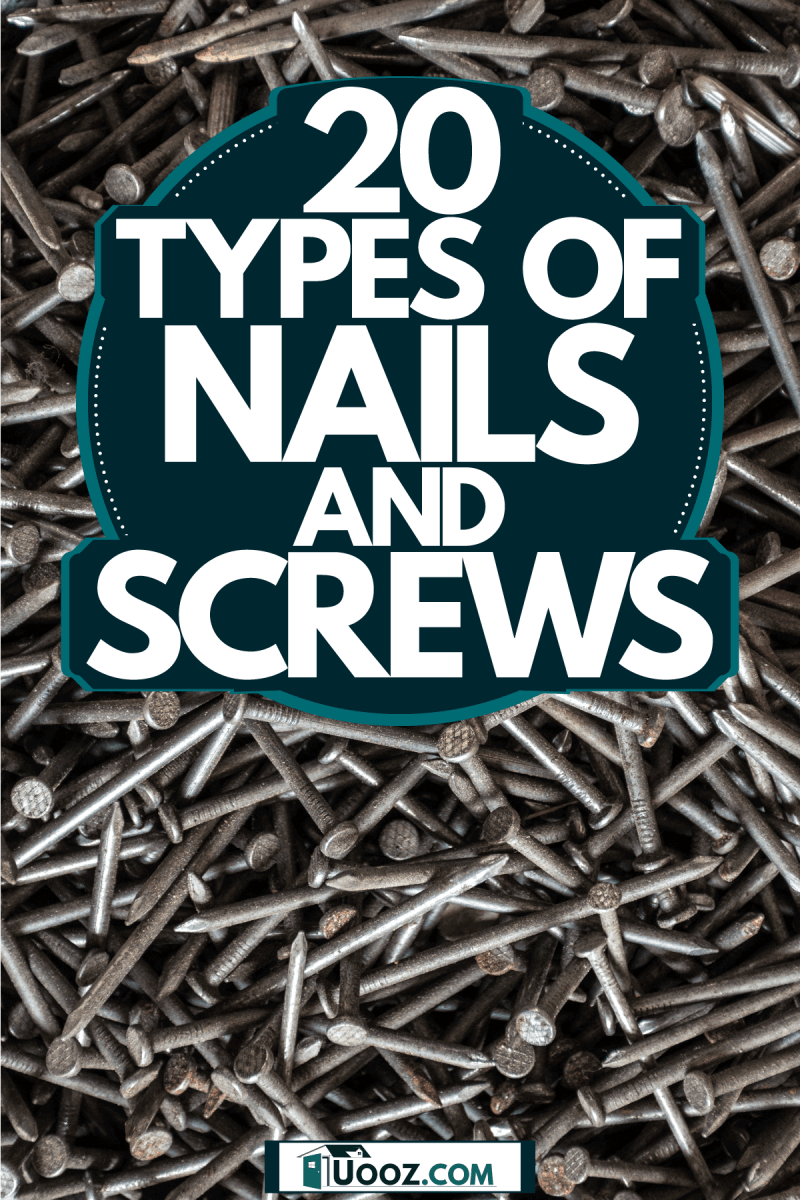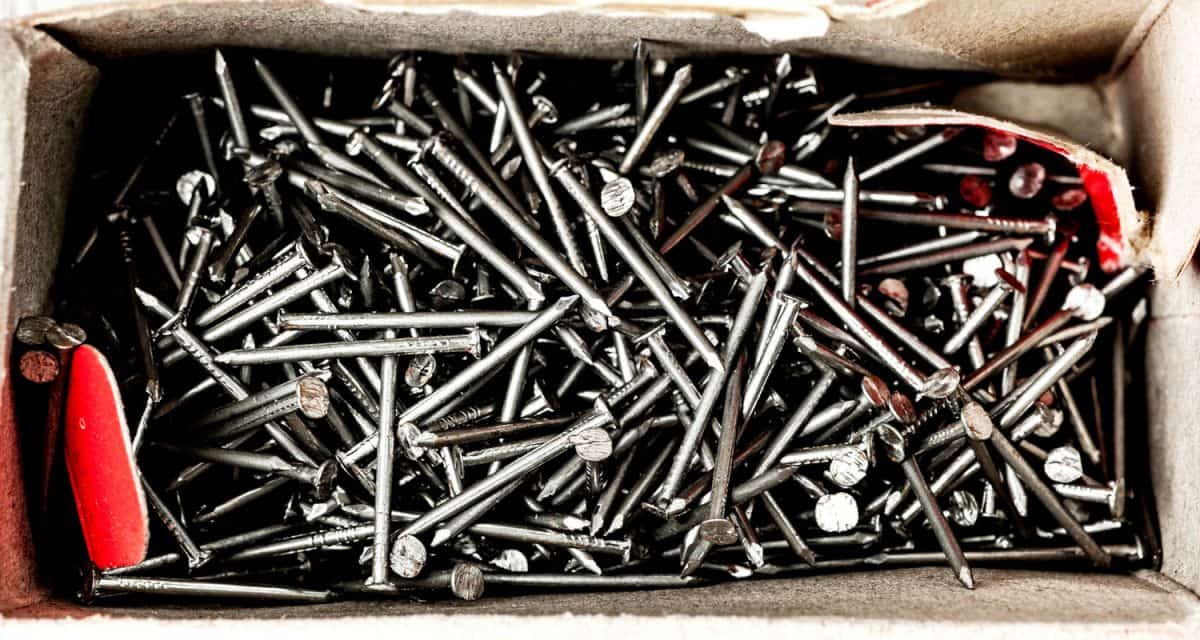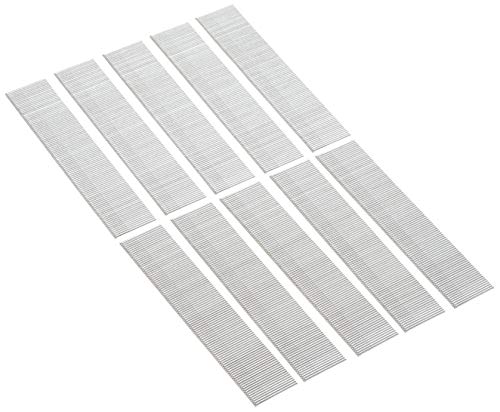It's a smart move to learn about the different types of nails and screws you are likely to encounter for repairs, installations, and decorating projects. Whether you hire a professional contractor or want to complete a task with a friend, you should be familiar with common fasteners used for flooring, walls, furniture, and appliances.
We researched a list of common nails and screws that you would come across at hardware stores, are included in kits, and have some fascinating points. Roll up your sleeves, and get ready to learn more about the typical uses for each type of fastener and any pros or cons.

Contents
Types of Nails
1. Common
Go to any hardware store, and it is easy to find a common nail. This type of nail has a thick shank, a wide, flat head, and a smooth surface. Sometimes these nails have a textured surface, but they have a sharp, diamond tip to penetrate. Use common nails for most basic construction projects and dimensional lumber.
Check out these common nails on Amazon.
2. Framing
Use framing nails for walls around 3 and 1/2 inches long, which are also called 16-penny nails or 16-d. The length of this nail is long enough to join materials without splitting wood or leaving too much wiggle room for dislodging. Note, this nail is used for fastening studs to the top and bottom plates.
Check out these framing nails on Amazon.
3. Finishing
When you need a flawless finish for a project with nails hidden out of sight, choose a finishing nail that has a small head. Note, this nail is typically used to finish molding, trim and leaves a small hole that can be filled with putty and painted out of sight. Finishing nails are a little thicker than brad nails and made from 15 or 16 gauge steel wire.
Check out these silver finishing nails on Amazon.
4. Roofing
When building a roof, it is essential to use roofing nails made from aluminum or stainless steel. Roofing nails have a wide head and a diamond-shaped point, so the decking stays intact when the fastener penetrates the material. Choose roofing nails that are galvanized or coated in zinc for asphalt shingles and aluminum nails for metal surfaces.
Check out these roofing nails on Amazon.
5. Box

A box nail is similar to a common nail, except that it is more commonly used for boxes, lighter wood pieces, and has a thinner shank. When fastening together clapboard siding, it is helpful to use box nails because they are less likely to crack the material. Choose box nails for framing and making boxes.
6. Brad
Brad nails are designed to prevent the cracking or splintering of delicate material when being joined together. Typically, this type of nail is made from 18 gauge steel wire and is useful for wood trim and paneling. Brad nails have a thin profile and a smaller head, making them optimal for temporary applications or craft projects because they leave a small hole. A brad nail doesn't offer as much strength and hold as a finishing nail or common nail.
Check out these brad nails on Amazon.
7. Flooring
There are a few different types of nails when installing flooring. To connect concrete subflooring and hardwood floors, cut flooring nails made from hardened, tempered steel is used. Sometimes 8-d finishing nails are used for flooring. Professionals often enlist flooring nails that are 16, 18, or 20 gauge because it allows the flooring to contract, expand, and maintain a good hold.
Check out these quality flooring nails on Amazon.
8. Drywall
Drywall nails stand out because they have a barbed or ringed shank for improved hold when used as a fastener. Some contractors debate whether to use drywall screws vs. drywall nails.
However, drywall nails have been successfully used to hang drywall for decades. Some drywall nails have cupped heads that are concave to better hide the nail on finishing. Note, these nails are faster to drive in when installing drywall and are more inexpensive than screws.
Check out these drywall nails on Amazon.
9. Siding
When engaged in a siding project, pick up siding nails that range between 1 and 1/2 inches to 2 and 1/2 inches in length. For wood siding, choose nails that resist rust and are hot-dipped with zinc treatment. The length needed for this nail should be able to penetrate and join the structural framing and any panels to ensure a good hold.
Check out this siding nail on Amazon.
10. Masonry
Masonry nails are readily identifiable for their thicker build, tapered structure, and square cross-section. A lot of force is needed to drive a hardened masonry nail into concrete, stone, or brick. These nails are less likely to break, bend, and are treated to resist corrosion. Note, masonry nails may be square, round, or fluted.
Check out these masonry nails on Amazon.
11. Cap
Cap nails are identifiable by the larger polyethylene cap that surrounds its metal head. Usually, cap nails join insulation foam board, house wrap, roofing felt, and tar paper. The cap helps reduce leaks.
Check out this popular cap nail on Amazon.
12. Duplex
The duplex nail has been called a scaffold nail or a double-headed nail, as evidenced by its inimitable double-headed structure. Typically, duplex nails are used to attach scaffolding and other temporary structures like braces. Note, these nails are quite easy to remove, making them an excellent choice for any temporary construction.
Check out this duplex nail on Amazon.
13. Upholstery
Upholstery nails or tacks are used for function and beauty, as the wide flat or slightly rounded button-style head are a decorative touch. Usually, these nails are out of sight, as they attach upholstery fabric to the underside and back of chairs, stools, and ottomans. Typically, this type of nail is for indoor use only and is not weather or rust-resistant.
Check out these upholstery nails or tacks on Amazon.
What Is The Strongest Type Of Nail?
What Type Of Nail Is Used For Rough Work?
The common nail is useful for a wide range of projects, including carpentry, framing, construction jobs. These nails work well because they can handle be driven into hardier materials and have a thick head. Common nails are a go-to choice when you need a fastener with strength, support, and function over beauty. Masonry nails are handy when joining wood to concrete, bricks, and other rough materials because of the metal composition and head shape.
Types of Screws
1. Wood
Look for silicone bronze or stainless steel wood screws that are built tough and designed to join pieces of wood together. Wood screws have medium-coarse threads and a shank that is not threaded close to the head, facilitating a tight fit between fastened pieces. You can find wood screws at most hardware stores, identifiable for having a flat head, pointed tip, tapered point, and coarse threads.
Check out these wood screws on Amazon.
2. Cement Board
When you need to join cement board to plywood, heavy metal, or another surface, you will need cement screws that are either 1 and 1/4 or 1 and 5/8 in length. Cement screws are designed to resist corrosion and have a wide head to ensure a solid grip. Standard screws cannot and should not be used to join cement boards due to the risk of corrosion.
Check out this cement board screw on Amazon.
3. Deck
When you have to build a boardwalk, deck, or patio, deck screws help keep the pieces of lumber that form the walking surface in place. Note, deck screws are weather-resistant, made from stainless steel or carbon steel, and can stand up against corrosion. To ensure a level surface that is attractive, the head of a deck screw is countersunk.
Check out these deck screws on Amazon.
4. Drywall
When you need to install drywall or sheetrock, it is best to employ drywall screws for their deeper threads and improved grip in the material. Drywall screws are designed to keep drywall in place so it won't easily dislodge from joists or wall studs, and are made from heavy-duty steel. Plastic drywall anchors are often made from plastic.
Check out this assortment of drywall screws on Amazon.
5. Lag
A lag screw also referred to as a coach screw, is a type of fastener used to join pieces of lumber. Note, this screw is very sturdy and can handle connecting materials that are subject to heavy load or under a lot of force. Also, lag screws often have a square or hex drive head, rough threads, and taper to a point.
Check out these quality lag screws on Amazon.
6. Machine
Upon observation, you'll notice that a machine screw has a uniform shape from top to bottom and lacks a tapered, pointed tip. You will have to have a pre-drilled hole or opening before screwing in this type of fastener. A bolt or another part helps keep this type of screw in place, which is commonly found on appliances. Be careful, as this fastener is smaller than the average screw.
Check out these machine screws on Amazon.
7. Concrete
You can identify concrete screws because they come in two different head types; either a flat head Phillips or a hex head. As these screws are available in different lengths, it's good to have various sizes at hand when you need to penetrate the concrete.
Concrete screws are a lighter form of masonry fasteners meant for indoor application and have external threading. Be mindful of whether the screws are light-duty, medium-duty, or heavy-duty.
Check out these concrete screws on Amazon.
8. Multi-Material
A multi-material or multi-purpose screw is valuable because it is useful for fastening sheet metal, wood, plastic, concrete, and masonry. When you need a replacement fastener, a multi-material screw is an excellent option that provides a high level of performance and gets the job done. Driving this type of screw into various materials is a dream.
Check out this multi-material nail on Amazon.
What Are The Different Types Of Screw Heads?
There are numerous styles of heads for screws. Here are some types of different heads you are likely to encounter:
- Binding
- Button
- Cheese
- Fillister
- Flat
- Flat Undercut
- Indented Hex
- Hexagon Washer
- Oval
- Phillips Countersunk
- Phillips Pan
- Round
- Square
- Truss
Please note, this is not an exhaustive list, but it covers a significant number of common screw head types.
What Tools Are Needed For Screws?
Depending on the type of screw you must use, and how it needs to be fastened, it will require different tools for the job. Most screws can be secured in place with a screwdriver. However, you may need to employ a socket, key, driver, or spanner. Tools used for a screw may include an electric or air power tool with a bit or a manual device.
In Closing
We hope you feel more confident about your knowledge of different nails and screws after reading this article. Nails and screws help fasten wood, metal, concrete, plastic, and other materials used for flooring, walls, furniture, and appliances.
Ensure you have the correct type of nail or screw and any necessary tools to safely and securely join together pieces of a project. It is essential to have a working knowledge of different types of nails and screws for everyday tasks around the home and understand a hired professional's decisions for an assignment.
Before you go, be sure to check out some of the following helpful articles:




















